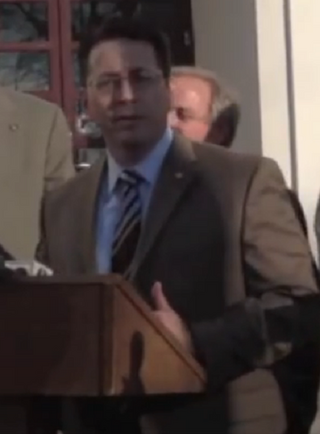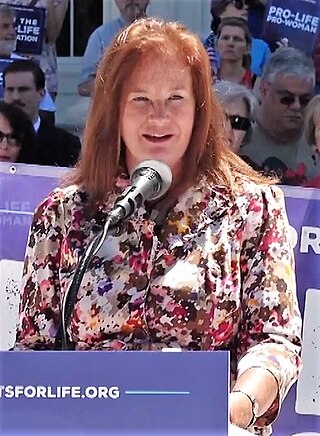Roe v. Wade, 410 U.S. 113 (1973), was a landmark decision of the U.S. Supreme Court in which the Court ruled that the Constitution of the United States protected a right to have an abortion. The decision struck down many abortion laws, and it sparked an ongoing abortion debate in the United States about whether, or to what extent, abortion should be legal, who should decide the legality of abortion, and what the role of moral and religious views in the political sphere should be. The decision also shaped debate concerning which methods the Supreme Court should use in constitutional adjudication.

In the United States, abortion is a divisive issue in politics and culture wars, though a majority of Americans support access to abortion. Abortion laws vary widely from state to state.
Thomas Wayne Butler is a politician, and member of the Alabama Senate. He represents the 2nd District as a member of the Republican Party. Senate District 2 encompasses east Limestone County and western Madison County. It includes the cities of Athens, Huntsville and Madison.
A trigger law is a law that is unenforceable but may achieve enforceability if a key change in circumstances occurs.

Kay Ellen Ivey is an American politician who is the 54th governor of Alabama, serving since 2017. Originally a conservative Southern Democrat, Ivey became a member of the Republican Party in 2002. She was the 38th Alabama state treasurer from 2003 to 2011 and the 30th lieutenant governor of Alabama from 2011 to 2017.
A six-week abortion ban, also called a "fetal heartbeat bill" by proponents, is a law in the United States which makes abortion illegal as early as six weeks gestational age, which is when proponents claim that a "fetal heartbeat" can be detected. Medical and reproductive health experts, including the American Medical Association and the American College of Obstetricians and Gynecologists, say that the reference to a fetal heartbeat is medically inaccurate and misleading, for a conceptus is not called a fetus until eight weeks after fertilization, as well as that at four weeks after fertilization, the embryo has no heart, only a group of cells which will become a heart. Medical professionals advise that a true fetal heartbeat cannot be detected until around 17 to 20 weeks of gestation when the chambers of the heart have become sufficiently developed.
John Westley Rogers Jr. is an American politician from the state of Alabama. A member of the Democratic Party, Rogers served in the Alabama House of Representatives, representing the 52nd district.

Gary James Palmer is an American politician serving as the U.S. representative for Alabama's 6th congressional district since 2015. His district includes the wealthier parts of Birmingham, as well as most of its suburbs. Before becoming an elected official, Palmer co-founded and served as the longtime president of the Alabama Policy Institute, a conservative think tank.

Gerald H. Allen is a Republican lawmaker in the Alabama Senate. He previously served in the Alabama House of Representatives.

Phillip W. Williams Jr. is an American politician, radio show host and attorney from the state of Alabama. A member of the Republican Party, Williams served in the Alabama Senate from 2010 until 2018, representing the 10th district, encompassing Etowah County and parts of Cherokee County. Since leaving the state legislature, Williams has served as a policy director for the Alabama Policy Institute and hosts a conservative radio program, Rightside Radio.

Terri Doyle Collins is an American politician. She is a member of the Alabama House of Representatives from the 8th District, serving since 2010. Collins has sponsored 469 bills as of March 1, 2017. She is a Republican.

Napoleon Bracy Jr. is an American politician. He serves as a Democratic member of the Alabama House of Representatives, representing Mobile County, Alabama. In May 2017, he opposed the bill for the Alabama Memorial Preservation Act, which would make it harder to remove Confederate monuments in Alabama; he argued, "People that sponsor bills like this don't care about me."

Juandalynn Deleathia "Lee Lee" Givan is an American lawyer and politician. She serves as a Democratic member of the Alabama House of Representatives, where she represents Jefferson County.
The Alabama Memorial Preservation Act of 2017 is an act of law in the U.S. state of Alabama which requires local governments to obtain state permission before moving or renaming historically significant buildings and monuments that date back 40 years or longer.

The Human Life Protection Act, also known as House Bill 314 and the Alabama abortion ban, is an Alabama statute enacted on May 15, 2019, that imposes a near-total ban on abortion in the state. Originally set to go into effect in November 2019, a legal challenge against the bill delayed implementation until 2022. The bill was passed in both chambers of the Alabama Legislature in a party-line vote and signed by Republican governor Kay Ivey. Under the Human Life Protection Act, a doctor who performs a banned abortion in the state of Alabama is guilty of a Class A felony, and could be sentenced to life imprisonment. Several proposed amendments that would have allowed abortions in cases of rape and incest were rejected.
Abortion in Alabama is illegal. Historically, Alabama's abortion laws have evolved from strict regulations in the late 19th and early 20th centuries to a period of liberalization following the landmark 1973 Supreme Court decision in Roe v. Wade, which legalized abortion nationwide. However, Alabama has consistently enacted legislation aimed at restricting access to abortion.
Abortion in Missouri is legal up to the point of fetal viability as a result of 2024 Missouri Amendment 3 taking effect on December 6, 2024, 30 days after the November 5, 2024 general election.
Abortion in Mississippi is illegal. The new law took effect on July 7, 2022, after Mississippi State Attorney General Lynn Fitch certified on June 27, the Supreme Court decision on Dobbs v. Jackson Women's Health Organization on June 24 of that year. State Attorney General Lynn Fitch's certification made Mississippi's 2007 'trigger law' go into effect and ban all abortions in the state, “except in the case where necessary for the preservation of the mother's life or where the pregnancy was caused by rape".
Abortion in Tennessee is illegal from fertilization except to "prevent the death of the pregnant woman or to prevent serious risk of substantial and irreversible impairment of a major bodily function of the pregnant woman". Tennessee is one of four states which prohibit abortion in their state constitution; alongside Alabama, Louisiana, and West Virginia.
Dobbs v. Jackson Women's Health Organization, 597 U.S. 215 (2022), is a landmark decision of the U.S. Supreme Court in which the court held that the Constitution of the United States does not confer a right to abortion. The court's decision overruled both Roe v. Wade (1973) and Planned Parenthood v. Casey (1992), returning to the federal and state legislatures the power to regulate any aspect of abortion not protected by federal statutory law.








